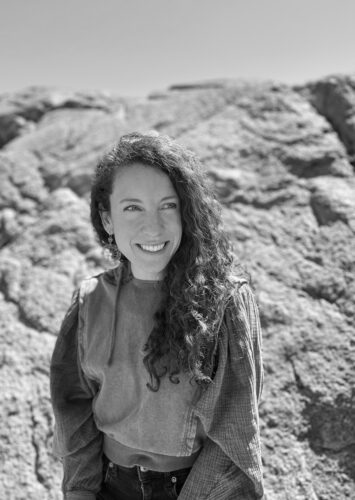I.
If the body is six parts water,
what would it mean to wake
on a rock as a sacrificed daughter,
the pale mass at the heart of the lake,
Andromeda landlocked, chains
dragging her heart down. What’s at stake
in the matter of bones when the scans
name the solid as probable cancer,
as a whiteness that drains
life. In the evening, sun dances
across the water’s wide surface. I can see
mountains in distance, the chances
that take deep purple shapes imperceptibly
when the atmosphere clears. Before
she was saved, Andromeda had to be
promised in marriage, her body sworn
as undamaged and lashed
fast in the current. We are each born
into body-locked waters, washed
by our mother’s blood in amniotic
baths. I can forget the gashes
on my shins when I dive to the aphotic
zone—no sunlight here, no weeds
to snag on—instead a tryptophanic
stupor pulling me inward and down. I bleed
the colors of this lake: steel gray and blue
-streaked green. Its circulation needs
taut afternoon winds blowing due
south, the Kennebago’s mouth spitting
its insides out until the true
currents turn over each other. I’m bound to quit
sitting up late on this small rock some man named
for a cocktail. I’m sick of being bit
by the fish that flit over my ankles, of being shamed
in the daylight. Perseus drove a hard bargain.
The maiden was saved, never blaming
her father or the gods for how far
their barters carried her, by land or by water.
In summer skies, her mother’s scars
carve a large w across the night’s face. I’ve cauterized
the cuts and let the chains sink
to the murk of wrecks and other long-drowned slaughters.
It begins in the womb: the original limnology.
I draw the shifting border with blue ink,
dragging my line close to the shore like an apology.
II.
The Abenaki came here first of course, naming
these waters for where the moose drank—
this was before deracinating, logging, the shame
of stolen places. I had a doll that sank
to the bottom thirty years ago; I dreamt her face-
down in the mud. All of my life, we drank
from this lake, with its dead feather smell, the iron-taste
soft in the back of our throats. It is fed
by three rivers, three currents that race
to churn into its hundred-foot belly where the dead
float, then empties into another long river.
At night, the sky is pink, the rims of clouds red
as the blood of smashed fish that shiver
on docks and fresh roadkill from Route 16,
as a nation’s ripped flag, as a prized liver
cut fresh from the steaming cavity. The lacustrine
successions carry our prayers far, sweep
them to other shores: lost moorings greening
with slime and silvered driftwood, endings we keep
or let go. The ice breaks up in May
when the fog and warm air weep
across the hibernating surface. Decay
turns over in the benthic zone, and I’m alone
with my memory and the splintered gray
world where loons resume limnetic, known
existences, diving for trout, rising in small
patches of water between ice sheets blown
apart by strong winds. The winter walls
in everything here—some weather with mangy coats
and thick feathers, low grumblings, soft calls.
III.
Let me begin with the anterior tilt
of the pelvis and back-tipped uterus—two parts
working in opposition. We built
a house on a slab foundation that had started
to warp and bow from the hillside eroding,
no perimeter drain, waterlogged at its heart.
There, at the confluence of time and water, we rowed
our lifeboat into the middle just in time
for the storm. All of my life, I’ve stowed
my deepest wants inside—walled by rime
like frozen pondwaters, the slow fish
floating. The word home is an off-rhyme
I’ve made for the comfort of circled-in spaces, a wish
dropped into fountain pools, an egg
let loose in the waters to birth flesh
of my flesh, or the shed lining like fog
stuck at the edge of the lakebed. I’ve prayed
for whitecapped summer days, begged
for the clarity of systems that unbraid
in the fall. Old symbioses curve like bodies
cradling each other on the shore among frayed
ends of bow lines, promises perfectly unmade.
